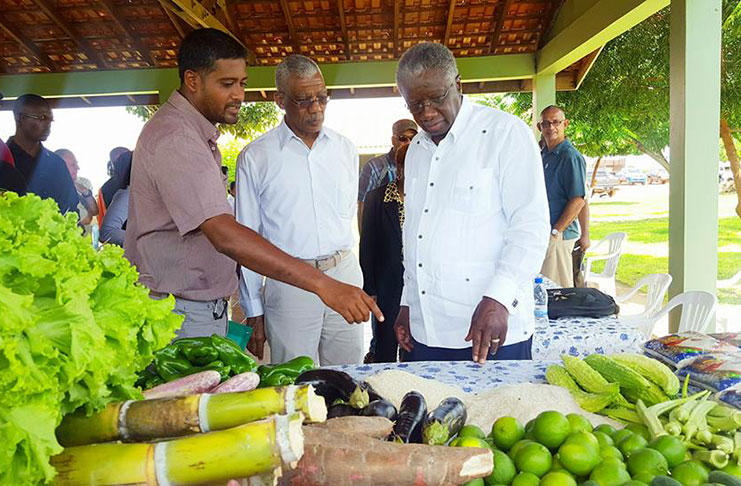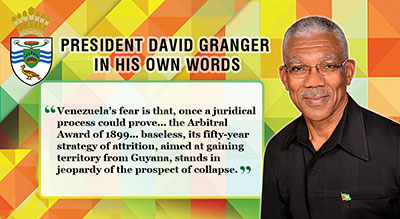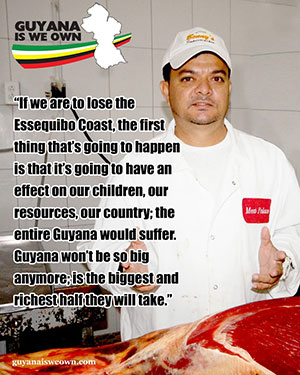PRESIDENT David Granger served as Chair of the Caribbean Community (CARICOM) from January to July, 2017 and during his tenure, he emphasised the economic, environmental and physical security of the citizens who make up the populations of member states. The Guyanese Head of State placed at the top of the regional agenda our right, as members of the community, to citizenship, to food security and economic viability, a safe and secure existence and the protection of our territorial integrity.

Recognising that the small states that make up the region must stand firmly together in the face of a constantly changing global environment, President Granger believes that the CARICOM Single Market and Economy (CSME) is the key to addressing these bread and butter issues for CARICOM citizens.
Foreign Policy Coordination
Effective foreign policy coordination is viewed as an important enabler for building resilience by effectively positioning CARICOM and the member states in the global arena through collaboration, cooperation and strategic alliances, the promotion and protection of

the interest of CARICOM and other small states to mitigate vulnerability and the leveraging of resources for regional priorities. Heads of Government of CARICOM continue to articulate and harmonise policies and programmes to safeguard and promote the Community’s interests within the global environment. President Granger has attached great importance to foreign policy coordination, even as individual states within the Community pursue their national interests. He believes that foreign policy coordination is one of the four pillars on which the Caribbean Community stands.
Within a current international environment that is replete with uncertainty and complexity, President Granger warned that the efficacy of the Community’s international advocacy could be impaired if coordinated regional positions are weakened. “The Caribbean Community cannot cling to an obsolete model of insularity in light of these international changes. The mirage of 15 airlines, 15 cricket teams, 15 defence forces and 15 embassies in the capitals of the world might mesmerise a few sentimental romantics, but could deplete the treasuries of our states. The Community, challenged by the constantly changing international situation, must redouble its efforts to ensure a more safe society for its citizens, more stable economies for its countries, deeper solidarity and a more secure hemisphere,” the President said.
This strength in a unified foreign policy approach in the region, the Guyanese Leader said, is demonstrated in the Community’s collective stance on the Guyana/Venezuela Border controversy. CARICOM, at the 38th Conference of Heads of Government Meeting, in Grenada this month, reaffirmed its collective support for the principles enshrined in international law for safeguarding territorial integrity, sovereignty and national independence by supporting Guyana in the border controversy.
The President welcomed the Communiqué issued at the close of the Heads of Government Meeting, where CARICOM reiterated its “firm and unequivocal support for the maintenance and preservation of Guyana’s sovereignty and territorial integrity,” with regard to the Guyana/Venezuela controversy.
The Heads of Government welcomed the appointment of His Excellency Dag Nylander as Personal Representative of the UN Secretary-General in the Good Offices Process for the duration of 2017, with a strengthened mandate of mediation. They noted that “if by the end of 2017, the Secretary-General concludes that significant progress has not been made toward arriving at a full agreement for the solution of the controversy, he will choose the International Court of Justice as the next means of settlement,” unless the Governments of Guyana and Venezuela “jointly request that he refrain from doing so.” They recognised the strong commitment of the Secretary-General to the process and joined Guyana in acknowledging his efforts.
During the closing press conference of that Meeting of the Conference of the Heads of Government, President Granger said, “Since CARICOM has been established, the Caribbean has always stood behind Guyana and we are very satisfied with not only the Caribbean, but also the Commonwealth and other countries around the world that realised that the Venezuelan claim is completely absurd and spurious and we have always been able to rely on the support of our colleagues.” Guyana’s Foreign Minister, Mr. Carl Greenidge, had expressed similar sentiments, while noting that Venezuela’s threats cut across international laws, treaties and sanctity, making it clear that the claim to two-thirds of the country was baseless.
The Community’s ability to come up with a coordinated stance on international matters was also tested on the matter of internal unrest in Venezuela. Member states of the Caribbean Community had to work together to arrive at a common position as it relates to the crisis in Venezuela. Maintaining solidarity and unity of purpose and following deliberations, the CARICOM member states in their declared position in the Communiqué they “reaffirmed their guiding principles of adherence to the rule of law, respect for human rights and democracy, as well as for the fundamental principles of non-intervention and non-interference in the internal affairs of states.”
In a meeting ahead of the specially called ‘consultation’ of foreign ministers at the Headquarters of the Organisation of American States (OAS), held on May 31, 2017 , a draft declaration on behalf of CARICOM member states was presented by The Bahamas Foreign Minister, Darren Henfield, where CARICOM’s commitment to the principles of non-intervention and non-interference in sovereign states was emphasised. The need for all parties to hold constructive dialogue and a peaceful outcome to the problems in Venezuela were reiterated. Since that time, CARICOM leaders have worked to refine and reaffirm their position and President Granger, speaking on the side-lines of the Heads meeting in Grenada noted that the region must remain a zone of peace.
“We hope that the Venezuelan people could return to full democratic rule and full public order as quickly as possible without the interference of third states. That is our ambition. We don’t want to intervene. Venezuela, I think, is one of the most mature democracies in the Region. It has a tradition of elections. Right now they are undergoing some instability and we want to make sure that at the end of the day, you know, the Venezuelan people are satisfied with the outcome; it’s peaceful and they return to full democratic rule. Right now there is a bit of turbulence, but we all hope that it will end sooner rather than later,” the Guyanese leader said.
Director-General of the Foreign Service, Ms. Audrey Waddle, speaking at the Heads of Mission Conference held in Guyana in April, 2017, underscored the importance for Guyana; while a member of the Caribbean Community, as an individual state, to ensure that its foreign policy is crafted in a way which guarantees protection of its sovereignty. She outlined Guyana’s efforts to ensure that “prudent, pragmatic and sustainable” approaches to diplomacy are a valued investment, given the current global environment. In the context of a small state such as Guyana, with well-known and varied capacity, a strong foreign service is imperative. Ms. Waddle noted that “The preservation of sovereignty and territorial integrity, security against external threats and the pursuit of economic policy remain the central impulses … avails us of an unparalleled opportunity to undertake collectively a review of the discharge of our responsibilities in order to obtain our pivotal foreign policy objectives.
President Granger believes that the work CARICOM has done to arrive at collective positions on these matters has served to test and strengthen foreign policy coordination.
Regional Security
The Caribbean is located between the continents of North and South America and several expressions have been used to describe it, including the ‘soft underbelly of the United States,’ as such, President Granger emphasised the need for citizens of the region to be aware its geopolitical significance. The fact that the Caribbean Community is constituted by many jurisdictions scattered over thousands of square kilometres of sea space, President Granger said that makes the region susceptible to external threats.
He said “There is a fear that we could be taken advantage of. We are susceptible to transnational crime and as you know, in the western hemisphere there has been a substantial exportation of illegal narcotics; there has been gun running; there has been human trafficking and there has been terrorism. So these risks, these threats make us as a potential zone of instability and for that reason we need to ensure that the states of the Caribbean Community are protected from the threat of instability, because individually we cannot provide the sort of defence that big states like Brazil or Colombia would be able to provide for themselves so we have… unity is important. We have to work together and also we have to make sure that the Caribbean is a zone of peace and we have to make sure that the bigger states recognise their responsibility to protect our security.”
CARICOM is part of the Caribbean Basin Security Initiative (CBSI) and other programmes within the region, however, the Outgoing Chair pointed out that finance and other factors have led to some of the agencies created over a decade ago, collapsing. He emphasised the need for countries in the region to share information and intelligence about persons moving throughout the jurisdictions, the need for better integration among the police forces and intelligence services within the framework of a transnational organisation. President Granger said there is no way a single state within the regional grouping can effectively track the movement of terrorists in and out of the Region, therefore information sharing is mandatory.
“We need to develop the assets, for example, surveillance. We need to have persons trained and we need to develop links with international organisations, but I would say that over the last ten years we’ve learnt a lot of lessons and the structures are there. We need to add meat; we need to add flesh to those structures to make sure that there are sufficient people trained, that the means of transmitting information are improved. So, we are in a good place. We have a high degree of trust with the people in the metropolitan countries with whom we have to deal,” the recent past Chair urged.
CARICOM Single Market and Economy
Upon his assumption of the Chairmanship of CARICOM, President Granger promised to work with his regional counterparts to promote the establishment of the economic basis for the CARICOM Single Market and Economy (CSME) and integration, the deepening of which is expected to boost the economic well-being of all member states. The Guyanese Head of State remains optimistic that the CSME is the best vehicle to allow small states to compete in the global economy while promoting economic and social development. He said that the Community is constantly challenged by the changing international environment and called for a redoubling of efforts to ensure stable economies.
Speaking more recently, the Head of State described the CSME as the single most important, most ambitious project of the Community in 44 years, hence he has attached great significance to it and its success, noting that it would be difficult for the states to exist as a Community without it. He said, “It affects our single domestic space, it affects our internet communication space, it affects our single security space. It affects everything to the extent that [if the] CSME doesn’t work well, [that] means that the Community will fail to achieve its objective. We’ve been at it for a very long time.
I feel that part of the problem is the shared size of the Community; it’s over 3000 sq. km between Nassau and Paramaribo and transportation has always been a big problem. Traditionally the Caribbean has been penetrated by commodities… from the bigger countries like the United States, United Kingdom, Canada and because of our plantation economies we have never really developed a sufficiently wide base for local produce.”
The President expressed confidence that once the CSME progresses, the Caribbean Community would become very prosperous but, he noted that geographical and cultural barriers must be overcome. “The barriers are not insuperable. We need to remove what I call the non-tariff barriers; bureaucrats put obstacles in the way of imports from other countries. We need to ensure that our civil servants at the level of customs, at the level of the port authorities are more appreciative. We are not asking them to break rules. We are asking them to be aware of the need to move more quickly to develop this single market,” the President said.
President Granger also described the CSME as CARICOM’s best response to changes in traditional European markets, growing economic liberalisation and the emergence of additional economic blocs and in order to advance this, there must be political will at the level of regional leadership.
The CSME is still the best vehicle to allow small states to compete in the global economy while promoting economic and social development. The CSME is the most ambitious project attempted by the Community; it must not become its most ambiguous,” President Granger noted.
Agriculture and Food Security
The recent past Chair has stressed that CARICOM’s food insecurity must be reversed if the Caribbean is to survive, pointing out that Guyana’s farmers can contribute to regional food security by increasing agricultural output. During a visit to the Sante Fe Mega Farm located in the North Rupununi, Upper Takutu-Upper Essequibo Region (Region Nine) in June, 2016 with Barbados Prime Minister, Mr.Freundel Stuart, extended an invitation to Barbadian entrepreneurs, urging them to combine their product with those available in Guyana, as part of a broader Caribbean project aimed at developing the countries for the citizens.
The President said that the door is open, since Guyana has the land space and once there are investments and expertise, the countries can become as prosperous as any other part of the world. Prime Minister Stuart, while acknowledging the invitation, said that Guyana is definitely open for business and investments in agriculture and that the success of the Santa Fe farm can serve as a model for other investors from other parts of the Caribbean and farther afield to get on board. The Santa Fe farm spans a total of 29,000 acres of arable lands in the North Rupununi. It represents a thriving agricultural business venture which is a major investment by prominent Barbadian investor, Sir Kyffin Simpson in Guyana’s agriculture sector.
Progress would be realised faster, Mr. Granger said, once the countries overcome their “infatuation” with foreign foods and accept that the region as a whole can feed itself and export commodities to other parts of the world. During the 37th Regular Meeting of the Heads of Government of the Caribbean Community, in July 2016, President Granger seized another opportunity and called on regional leaders to invest in Guyana, including investing in the country’s vast agricultural potential. He noted that the countries of the Caribbean have the capital, while Guyana has the land and freshwater. The President at that time said there is no reason why member states should not engage in a partnership aimed at increasing agricultural output to help achieve food security in the Caribbean.
President Granger has said that Guyana can play a meaningful role in becoming the rice bowl and vegetable basket of the Caribbean and envisions the country playing this role through investment, infrastructure, information and innovation in agriculture.



.jpg)










